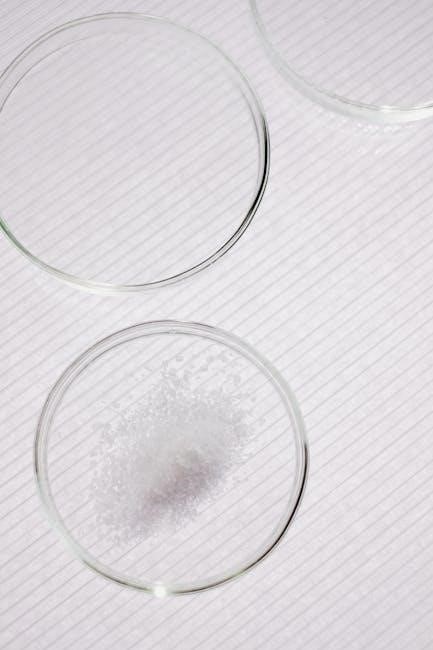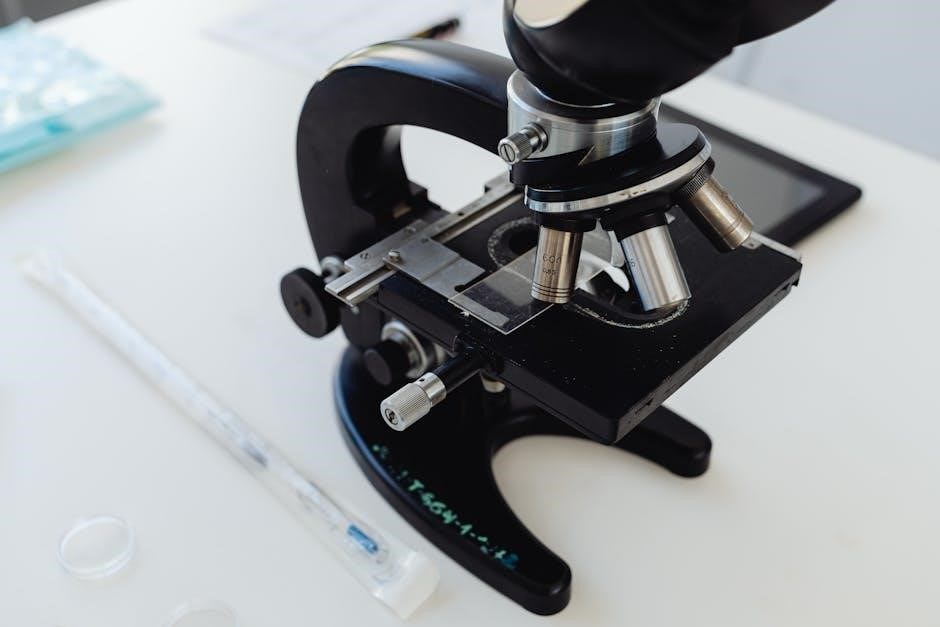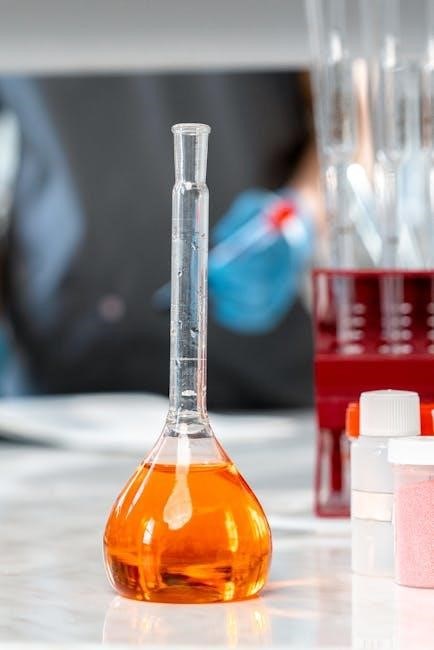AP Chemistry practice tests are essential study tools for exam preparation‚ offering multiple-choice and free-response questions with answer keys‚ mirrors the actual exam format‚ and helps identify areas for improvement.
Importance of Practice Tests in AP Chemistry Preparation
Practice tests are vital for AP Chemistry preparation‚ as they simulate exam conditions and help students assess their understanding of key concepts. They provide opportunities to identify weak areas‚ improve problem-solving skills‚ and enhance time management. With answer keys and scoring guidelines‚ students can self-evaluate and focus on targeted studying. Regular practice fosters confidence and reduces exam anxiety‚ ensuring readiness for the actual test. Additionally‚ practice tests cover a wide range of topics‚ mirroring the exam format‚ which helps students familiarize themselves with question types and difficulty levels. This structured approach ensures comprehensive preparation and improved performance on the AP Chemistry exam.
Overview of the AP Chemistry Exam Format
The AP Chemistry exam is divided into two main sections: Section I‚ which includes 60 multiple-choice questions‚ and Section II‚ featuring 7 free-response questions. Section I is completed without a calculator‚ while calculators are allowed for Section II. The exam is designed to assess both conceptual understanding and practical application of chemistry principles. Multiple-choice questions test factual knowledge and problem-solving skills‚ while free-response questions evaluate critical thinking‚ experimental design‚ and analytical abilities. The exam format ensures a comprehensive evaluation of students’ mastery of chemistry concepts‚ laboratory practices‚ and data interpretation skills‚ aligning with the curriculum framework provided by the College Board.

Structure of the AP Chemistry Exam
The AP Chemistry exam consists of two sections: Section I has 60 multiple-choice questions‚ and Section II includes 7 free-response questions. The total exam duration is 3 hours‚ with 90 minutes for Section I and 90 minutes for Section II‚ allowing students to demonstrate both problem-solving and analytical skills effectively.
Section I: Multiple-Choice Questions
Section I of the AP Chemistry exam consists of 60 multiple-choice questions‚ requiring students to select the best answer from five options. These questions cover a wide range of topics‚ from fundamental concepts like atomic structure and chemical bonding to more complex areas such as thermodynamics and chemical kinetics. Students have 90 minutes to complete this section‚ with no calculator allowed. The questions are designed to test factual knowledge‚ problem-solving skills‚ and the ability to analyze data. Practice tests provide sample multiple-choice questions with answer keys‚ helping students identify weak areas and improve their understanding of key concepts. Regular practice with these questions enhances time management and critical thinking‚ essential for success in this section. Mastering Section I is crucial‚ as it accounts for 50% of the total exam score.
Section II: Free-Response Questions
Section II of the AP Chemistry exam includes 7 free-response questions‚ divided into two parts: three long questions and four short ones. These questions assess in-depth knowledge‚ analytical skills‚ and the ability to articulate scientific concepts clearly. Students have 105 minutes to complete this section‚ with calculators permitted. Practice tests provide sample free-response questions‚ along with scoring guidelines and exemplar answers‚ allowing students to understand how to structure their responses effectively. Reviewing these materials helps students improve their ability to tackle complex problems and communicate their reasoning. The free-response section accounts for the remaining 50% of the total exam score‚ making it equally important to the multiple-choice portion. Regular practice with these questions is essential for achieving success in this section.

Where to Find AP Chemistry Practice Tests
Find AP Chemistry practice tests through official College Board resources‚ third-party websites‚ and study guides. These materials offer multiple-choice and free-response questions with detailed answers.
Official Resources from the College Board
The College Board provides authentic AP Chemistry practice tests‚ including past exams and modified versions‚ through their official website. These resources are ideal for exam preparation‚ as they mirror the actual test format. They include multiple-choice questions‚ free-response prompts‚ scoring guidelines‚ and sample student responses. The official materials allow students to familiarize themselves with the exam structure and time constraints. Additionally‚ teachers can download and distribute these materials to their students. The College Board also offers PDF versions of past exams‚ making it easy to print and practice under timed conditions. These resources are highly recommended for accurate and comprehensive exam preparation.
Third-Party Study Materials and Websites
Beyond official College Board resources‚ third-party materials like The Princeton Review and Studyocu offer comprehensive AP Chemistry practice tests. These include PDFs with multiple-choice questions‚ free-response prompts‚ and detailed answer keys. Websites such as Studocu provide past exams‚ study guides‚ and summaries‚ while platforms like The Princeton Review offer full-length practice exams simulating real test conditions. These materials often include worked-out solutions and scoring guidelines‚ helping students assess their performance. Additionally‚ third-party resources frequently update their content to align with the latest exam format and topics. They cater to diverse learning needs‚ offering both printed and digital formats for convenient access. These resources are invaluable for students seeking extra practice beyond official materials.

Key Features of a Good Practice Test
A good practice test includes multiple-choice questions‚ free-response prompts‚ detailed answer keys‚ and scoring guidelines‚ mirroring the actual exam format to ensure accurate preparation and self-assessment.
Multiple-Choice Questions with Answer Keys
Multiple-choice questions (MCQs) are a cornerstone of AP Chemistry practice tests‚ closely mirroring the exam format. Each question presents five options‚ requiring students to select the best answer. Topics range from bonding and thermodynamics to kinetics and electrochemistry. Answer keys are provided‚ enabling self-assessment and understanding of correct responses. Detailed explanations often accompany answers‚ clarifying common misconceptions and reinforcing key concepts. Practice tests include questions of varying difficulty‚ ensuring comprehensive coverage of the curriculum. Solving MCQs helps improve time management‚ critical thinking‚ and problem-solving skills. By identifying weak areas‚ students can focus their studying on topics needing improvement. Regular practice with MCQs enhances familiarity with the exam structure and boosts confidence.
Free-Response Questions and Scoring Guidelines
Free-response questions (FRQs) in AP Chemistry practice tests simulate the exam’s open-ended section‚ requiring detailed‚ analytical answers. These questions assess conceptual understanding‚ laboratory skills‚ and the ability to articulate scientific principles. Scoring guidelines provide clear criteria for evaluation‚ emphasizing the importance of accurate reasoning‚ proper use of terminology‚ and adherence to scientific principles. Practice tests include sample student responses with commentary‚ offering insights into high-scoring answers. By reviewing these materials‚ students can refine their writing and critical thinking skills. FRQs cover topics like chemical reactions‚ equilibrium‚ and experimental design‚ ensuring a comprehensive assessment of knowledge. Understanding the scoring guidelines helps students focus on what examiners expect‚ enhancing their performance in the actual exam.

Strategies for Using Practice Tests Effectively
Utilize AP Chemistry practice tests by simulating exam conditions‚ reviewing mistakes‚ and focusing on weak areas. Track progress and adjust study strategies to enhance performance efficiently.
Simulating Exam Conditions
To maximize the effectiveness of practice tests‚ simulate actual exam conditions. Set a timer for the allocated time (e.g.‚ 3 hours and 15 minutes for the full exam) and work in a quiet‚ distraction-free environment. Use the same materials permitted during the real test‚ such as calculators for Section II. Replicate the exam setup by printing the test in PDF format and using answer sheets if available. This helps build stamina‚ reduces anxiety‚ and familiarizes you with the exam format. After completing the test‚ take a short break before reviewing answers to mimic test-day conditions. This approach ensures realistic practice and better preparation.
Reviewing and Analyzing Mistakes
After completing a practice test‚ thoroughly review and analyze your mistakes to identify areas for improvement. Compare your answers with the provided answer keys and scoring guidelines to understand where you went wrong. Pay attention to the reasoning behind correct answers and the common pitfalls that led to errors. For free-response questions‚ study the sample responses and commentary to improve your writing and problem-solving skills. Focus on understanding the concepts rather than just memorizing answers. This process helps refine your knowledge‚ builds test-taking strategies‚ and enhances your ability to tackle challenging questions effectively. Regular review of mistakes is key to achieving a higher score on the actual exam.

Tips for Mastering AP Chemistry Concepts
Mastering AP Chemistry requires consistent practice‚ understanding weak areas‚ and applying learned concepts to solve problems. Use practice tests to identify gaps in knowledge and improve accuracy.
Understanding Weak Areas Through Practice
Regular practice with AP Chemistry tests helps identify weak areas by highlighting recurring mistakes and gaps in knowledge. By reviewing errors and analyzing patterns‚ students can focus on improving specific topics‚ such as stoichiometry or thermodynamics. Answer keys and scoring guidelines provide clarity on common misconceptions‚ enabling targeted study. Free-response questions also reveal strengths and weaknesses in applying concepts. Consistent practice builds familiarity with the exam format and content‚ allowing students to address vulnerabilities effectively. This focused approach ensures a more efficient and impactful study plan‚ leading to better overall performance on the actual exam.
Building Confidence and Time Management Skills
Engaging with AP Chemistry practice tests PDFs with answers helps students build confidence and refine time management skills. By simulating exam conditions‚ practice tests familiarize students with the format and pacing‚ reducing anxiety during the actual exam. Regularly tackling multiple-choice and free-response questions enhances problem-solving speed and accuracy. Answer keys and scoring guidelines provide immediate feedback‚ allowing students to assess their progress. Over time‚ this consistent practice fosters a sense of mastery and readiness. Additionally‚ managing time effectively during practice translates to better performance under exam pressure‚ ensuring students can complete all sections without rushing or running out of time.

Common Mistakes to Avoid
Common mistakes include rushing through questions without reading them carefully‚ ignoring answer keys‚ and neglecting to review scoring guidelines for free-response questions.
Time Management During the Exam
Effective time management is crucial for success in the AP Chemistry exam. Allocate time evenly between multiple-choice and free-response sections. For Section I‚ spend about 1 minute per question. In Section II‚ divide time based on the complexity of each question. Practice tests help students gauge their pacing and ensure they complete all questions. Avoid spending too long on a single question; instead‚ move forward and return if time permits. Using practice tests to simulate exam conditions trains students to manage their time efficiently‚ reducing stress and improving performance. Proper time allocation ensures all questions are attempted‚ maximizing the score.
Strategies for Tackling Difficult Questions
When facing challenging questions‚ start by carefully reading and analyzing the question stem to identify key concepts. Eliminate obviously incorrect answers to increase the likelihood of selecting the right one. For complex problems‚ break them down into simpler steps and use prior knowledge or formulas to guide your reasoning. Practice tests reveal common question patterns‚ helping you anticipate and prepare for difficult topics. Reviewing mistakes and understanding the reasoning behind correct answers strengthens problem-solving skills. Staying calm and systematic‚ rather than rushing‚ improves accuracy. Utilize answer keys and scoring guidelines to learn from errors and refine your approach‚ ensuring better performance on the actual exam.
